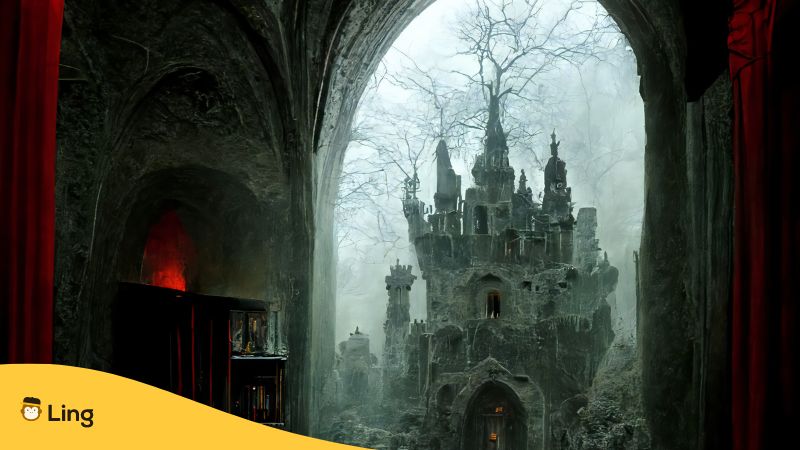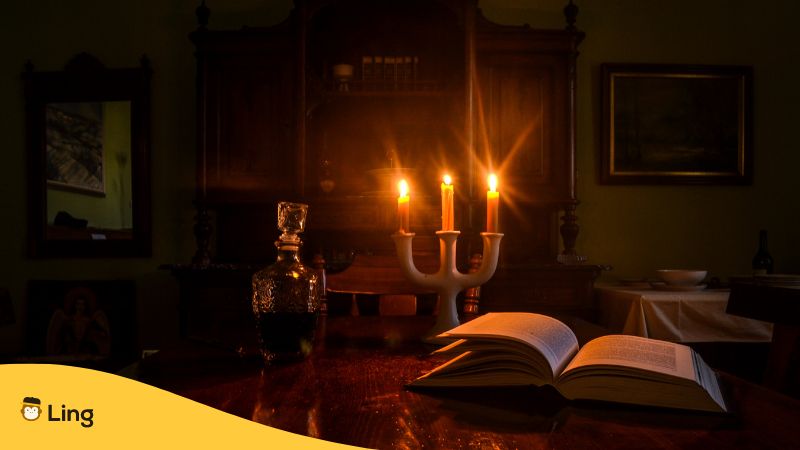China boasts a legacy of rich history and cultural heritage, and the many places believed to be haunted, which is called Nàoguǐ de (闹鬼的 in simplified Chinese & 鬧鬼的 in traditional Chinese), only add to its captivating allure. From imperial palaces to bridges and schools, there is no shortage of mysterious sites steeped in folklore for centuries. Whether you’re a skeptic or a believer, exploring these eerie locales will take you on a journey through the Chinese stories past and offer a thrilling glimpse into the unknown.
Haunted Places In China

Since you are reading this article, I believe you have dared to explore the enigma of China’s most infamous haunted places. Whether you believe in the paranormal or not, these haunted places in China offer a fascinating and eerie experience that takes you on a journey through the country’s rich cultural heritage. So, gather your bravest friends, and embark on an adventure through the shadows and into the unknown.
Join us as we delve into the mystery behind some of China’s top haunted places and uncover the legends and ghostly tales passed down through the ages.
The Old Summer Palace (Yuanmingyuan) In Beijing
Once the epitome of wealth and power, the Old Summer Palace in Beijing stands in ruins today. But despite its destroyed state, this imperial palace remains one of the most haunted places in China. This place’s ghost stories focus on sightings of ghostly concubines roaming the grounds, as well as strange noises and other unexplained events. The legend of a young imperial concubine forced to take her own life still haunts the palace, with some believing her spirit is seeking revenge on those who wronged her in life.
The Ancient City Of Pingyao
Let’s start with The Ancient City of Pingyao in Shanxi province, a well-preserved piece of China’s history, and its narrow, winding streets are said to be haunted by the spirits of its former residents. Visitors have reported ghostly sightings and strange noises, and the city is steeped in legends, including the story of a wronged woman who still haunts the city seeking revenge.
The Wuhan Yangtze River Bridge
The Wuhan Yangtze River Bridge spans the Yangtze River and is considered one of the most haunted places in China. Local legends say the ghost of a woman who died on the bridge still haunts it, causing strange occurrences and scaring those brave enough to cross it at night. The story goes that the woman took her own life after being jilted by her lover, and her spirit remains on the bridge seeking revenge.
The Old Huangpu Military Academy In Shanghai
Once one of the most prestigious military academies in China, the Old Huangpu Military Academy in Shanghai is now said to be haunted by the spirits of former soldiers and officers. Visitors have reported ghostly apparitions and strange noises, and one legend tells of a group of cadets who died during a training exercise and still haunt the academy seeking revenge.
The Beijing Drum And Bell Towers
Tucked away in the bustling metropolis of Beijing, China lies two iconic towers with a rich history steeped in tradition and mystery. Beyond their practical use, these towers have also garnered a reputation for being haunted. Visitors have claimed to have encountered ghostly apparitions of former drummers and guards, with strange noises and eerie events reported within the towers’ walls.
One of the most intriguing legends is that of a young musician who met his untimely end while playing the drums. As the story goes, his spirit still haunts the tower, causing the drums to pound ferociously in the dead of night.
Prince Gong’s Mansion/Gongwangfu Mansion
The Prince Gong’s Mansion/Gongwangfu Mansion is a historical building located in Wuxi, China, and is said to be one of the most haunted places in the country. The mansion was built in the late 19th century and was once the residence of a wealthy merchant family. However, the family’s fortunes worsened, and the mansion was abandoned for many years.
Over the years, many strange and eerie stories about the Gongwangfu Mansion have circulated. Some people claim to have seen ghostly apparitions of the former residents wandering around the halls.
The Huguang Huiguan Opera House
The Huguang Huiguan Opera House is a former guild hall located in Beijing, China, that was once a gathering place for artists and scholars. Despite its historical significance, the Huguang Huiguan is also said to be one of the most haunted places in Beijing. Visitors have reported ghostly apparitions of former artists and scholars, and strange noises and unexplained occurrences have been reported in the building.
The Forbidden City/The Imperial Palace
The Forbidden City, once the imperial palace of the Ming and Qing dynasties, now stands as a museum, beckoning tourists with its rich history and regal presence. Stories of the palace’s past inhabitants have been passed down through generations, painting vivid pictures of the powerful Empress Dowager Cixi, who allegedly still haunts the palace seeking revenge.
And though whispers of strange and gloomy voices and movements have been heard echoing through the halls, these tales of ghostly presence cannot be confirmed. Regardless, the Forbidden City promises a fascinating cultural experience, even if it is not the supernatural adventure some may seek.
Spooky Chinese Vocab

With all the spooky places, you must also wish to learn some spooky vocab. So here are a few words to know so you can always have a scary convo with native speakers.
A-G
| English | Chinese Simplified | Chinese Traditional | Romanization |
| Afraid | 害怕的 | 害怕的 | Hàipà De |
| Bat | 蝙蝠 | 蝙蝠 | Biānfú |
| Black Cat | 黑猫 | 黑貓 | Hēi Māo |
| Bones | 骨头 | 骨頭 | Gǔtou |
| Crying | 哭泣 | 哭泣 | Kūqì |
| Cursed | 诅咒 | 詛咒 | Zǔzhòu |
| Demon | 恶魔 | 惡魔 | Èmó |
| Eerie | 怪异 | 怪異 | Guàiyì |
| Evil | 邪恶的 | 邪惡的 | Xié’è De |
| Exorcism | 驱魔 | 驅魔 | Qū Mó |
| Frightened | 受惊 | 受驚 | Shòujīng |
| Full Moon | 满月 | 滿月 | Mǎnyuè |
| Graveyard | 墓地 | 墓地 | Mùdì |
| Grim | 严峻 | 嚴峻 | Yánjùn |
H-Z
| English | Chinese Simplified | Chinese Traditional | Romanization |
| Hag | 魔女 | 魔女 | Mónǚ |
| Howling | 嚎叫 | 嚎叫 | Háo Jiào |
| Incantation | 咒语 | 咒語 | Zhòuyǔ |
| Knife | 刀 | 刀 | Dāo |
| Living Dead | 活死人 | 活死人 | Huó Sǐrén |
| Lurking | 潜伏 | 潛伏 | Qiánfú |
| Monsters | 怪兽 | 怪獸 | Guàishòu |
| Morbid | 病态的 | 病態的 | Bìngtài De |
| Necromancy | 死灵法术 | 死靈法術 | Sǐ Líng Fǎshù |
| Owl | 猫头鹰 | 貓頭鷹 | Māotóuyīng |
| Palpitations | 心悸 | 心悸 | Xīnjì |
| Ritualistic | 仪式主义的 | 儀式主義的 | Yíshì Zhǔyì De |
| Satanic | 撒旦的 | 撒旦的 | Sādàn De |
| Scared | 害怕的 | 害怕的 | Hàipà De |
| Shaking | 摇晃 | 搖晃 | Yáohuàng |
| Skeleton | 骨骼 | 骨骼 | Gǔgé |
| Superstition | 迷信 | 迷信 | Míxìn |
| Terrified | 吓坏了 | 嚇壞了 | Xià Huàile |
| Vampire | 吸血鬼 | 吸血鬼 | Xīxuèguǐ |
| Weeping | 哭泣 | 哭泣 | Kūqì |
| Zombie | 僵尸 | 殭屍 | Jiāngshī |
Wrapping Up

If you are interested in learning more about China’s rich history and cultural heritage, consider learning the Chinese language with Ling. This app will improve your language skills and give you a deeper understanding and appreciation of this fascinating language. You can learn everything from Chinese names to birthday wishes and grammar points! So download the Ling from Google PlayStore and Apple AppStore now, and prepare to be fluent in Chinese very soon!




































































One Response
I am now living in Xiamen, Fujian, China. I have been a part of a paranormal research group in Florida USA.
I would be interested in finding any type of group here in China
Cheers Clint